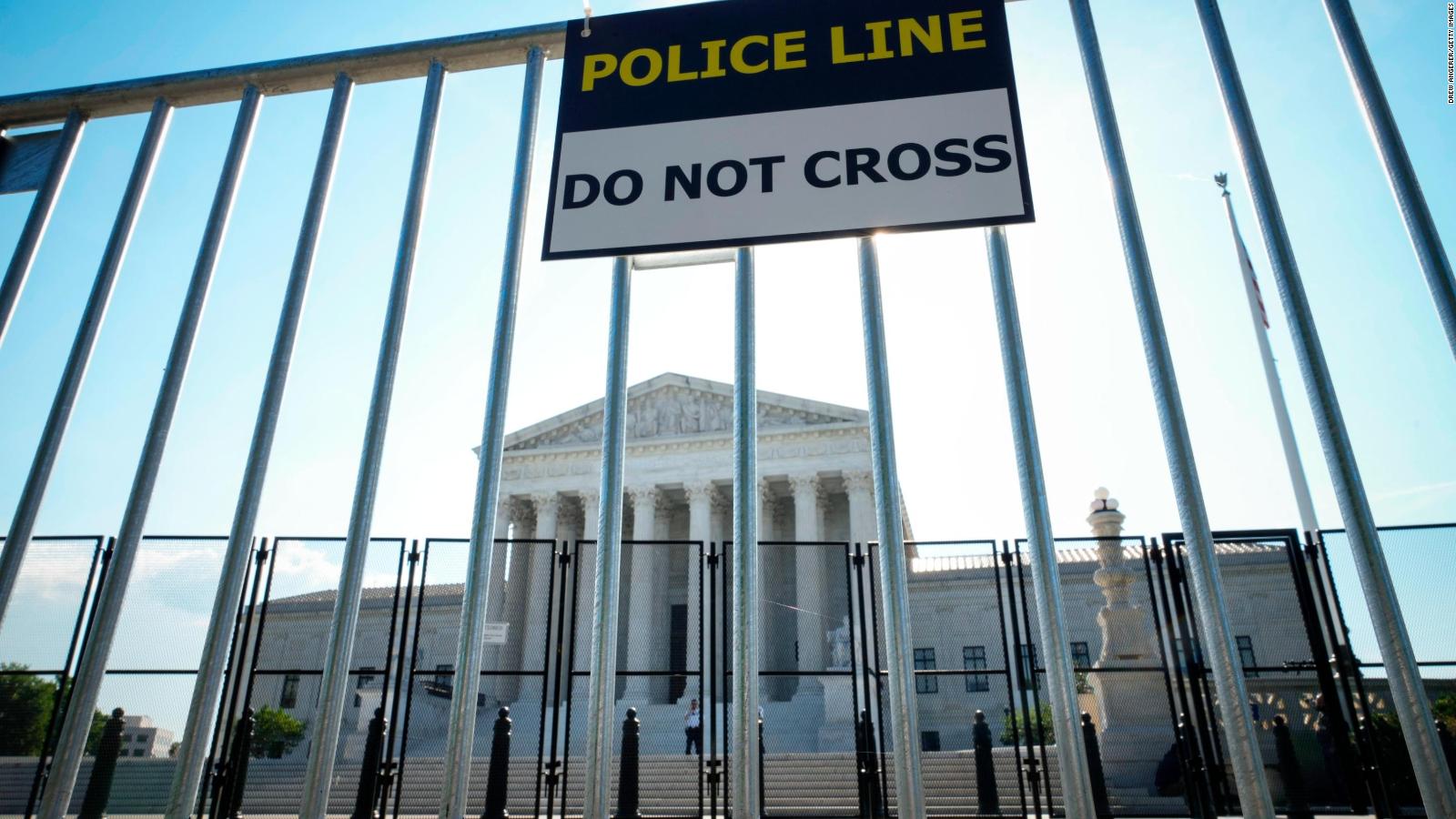USA: how ending abortion would affect fertility treatments 4:16
(CNN) —
The United States Supreme Court has overturned the landmark ruling that legalized abortion in the country.
The ruling says there is no longer a federal constitutional right to abortion.
What does this mean?
We answer some questions
Does the Supreme Court actually strike down the law or does it just say that the decision belongs to the law of each state?
The Supreme Court overturns previous court precedent that preempted state laws that ban abortion before the fetus is viable, a point around 23 weeks of pregnancy.
By overturning the decisions in Roe v.
Wade and Casey v.
Planned Parenthood, the Supreme Court would allow states to pursue bans and other restrictions on abortion prior to viability.
However, such a decision will not have the effect of banning abortion throughout the country.
According to the logic expressed in the draft decision, the issue of abortion policy would then go to state and local legislators, and possibly to federal legislators as well.
Will women be arrested for having abortions if the Supreme Court deems it illegal?
The criminal liability of an abortion seeker will depend on the abortion policies her state implements if Roe is struck down by the Supreme Court.
Leaders of the anti-abortion movement have said in the past that women should not be prosecuted for having an abortion and that criminal laws prohibiting it should be directed at abortion providers or others who facilitate the procedure.
Several states with abortion bans that could go into effect with a Roe reversal have language exempting the woman who obtained the abortion from prosecution, but a Wyoming abortion ban seems to confuse this question with its reference to the "pregnant woman " in the relevant code.
advertising
Abortion rights in the US: how it compares to other countries in Latin America and the rest of the world
There is also nothing to prevent lawmakers from passing laws requiring the prosecution of people who seek abortions.
A state legislator in Louisiana recently proposed a bill that would charge women with murder for having abortions, though that bill failed.
Critics of the anti-abortion movement also point out that even with Roe on the books, women have been prosecuted for pregnancies that ended in miscarriage or stillbirth.
What methods do legislators propose to enforce these laws?
What can they legally do to find out if someone is pregnant?
The state abortion bans that will go into effect with a reversal of Roe do not spell out specific enforcement tactics.
How far local prosecutors will go to enforce abortion restrictions is an unanswered question.
Before Roe, how aggressively abortion bans were enforced often depended on the political environment, including the local environment in which prosecutors navigated.
Now, some prosecutors in Democratic-leaning jurisdictions are vowing not to file criminal charges under the abortion restrictions that will go into effect with the new Supreme Court opinion.
The information that prosecutors will seek from health care providers to enforce abortion bans IS a major concern for reproductive rights advocates.
HIPAA protections that normally protect a person's health information from disclosure have exceptions for certain law enforcement contexts that may come into play if Roe is struck down.
Similarly, there is concern that data that can be obtained from an abortion seeker's digital devices could be used to determine whether an abortion was performed.
That could include information about her menstrual cycle on a period tracker app, some fear, or search terms she uses to search the internet.
Look at this man's risky way of protesting 0:32
In case of rape or incest or even pregnancy of minors under, say, 14 years old, where does the law stand for these people now that Roe v. Wade is overturned?
Exemptions in abortion bans for rape, incest, or maternal health will vary from state to state.
In the wave of limits on abortion that state legislatures recently passed in anticipation of the Supreme Court ruling, only some of the proposals included exemptions for rape and incest.
The 16 states where the right to abortion would be protected
It is a question that lawmakers will now review with the Supreme Court ruling.
As he previewed plans to convene a special legislative session once the opinion is issued, South Carolina Republican Gov. Henry McMaster said he opposed exemptions for rape or incest.
The six-week ban he signed into law last year, which is currently blocked by court order, included those exemptions.
On the other hand, Republican Arkansas Governor Asa Hutchinson told CNN in May that he supported adding rape and incest exemptions to the trigger law currently on the state's books.
How are in vitro fertilizations defined?
If a state defines the fertilized egg as a human being with rights, then if a doctor fertilizes four eggs, but [does not] implant all four in a woman, is that homicide?
What the annulment of Roe means for fertility treatments is one of great uncertainty.
Doctors and legal experts in the field are currently grappling with state abortion policies that frame their laws around the moment of fertilization, when the egg has joined the sperm.
Some of those state laws have language that appears to exempt the disposal of unused embryos created for IVF (In Vitro Fertilization), but that language does not necessarily exempt the selective reduction process, when a woman whose fertility treatments lead to a multiple pregnancy has one or more of those fetuses terminated to protect the viability of the other fetuses and/or the health of the mother.
More broadly, fertility law experts express concern about how a reversal of Roe will encourage lawmakers to regulate IVF procedures, which have been largely shielded from the abortion debate because of Roe's protections.
Can the right to abortion be codified by a national vote?
Not directly.
If the Supreme Court says that the Constitution does not guarantee the right to abortion, a constitutional amendment could be enacted to extend that right.
But the process of amending the US Constitution begins with a proposal that has the support of two-thirds of both houses of Congress or a convention called by two-thirds of the states.
Ratification of an amendment requires the support of three-fourths of the state legislatures or three-fourths of the conventions in each state.
Why doesn't the currently Democrat-controlled legislature pass a federal law legalizing abortion?
Democrats currently lack the votes to dismantle Senate filibustering, a 60-vote procedural mechanism that Republicans can use to block federal abortion rights legislation as long as 40 senators oppose it.
But it's worth noting that the Women's Health Protection Act, a bill that would codify and expand Roe, failed 49-51 when it was voted on in the Senate in May, meaning that even without the filibustering, it would not have become law.
There are also legal questions about whether it would be constitutional for federal lawmakers to enact a nationwide ban.
The late Justice Antonin Scalia emphasized in his legal writings on abortion that policy decisions belonged to individual states, while expressing skepticism that Congress has the constitutional authority to regulate the procedure.
However, Judge Samuel Alito's draft opinion uses remarkably open language that does not limit the provenance of abortion legislation to state legislators.
In pictures: the protests for the right to abortion in the US
Can anti-abortion states prevent women from crossing state lines to get abortions in another state?
I am concerned that states may enact more laws that restrict women from leaving the state for an abortion.
Anti-abortion state legislators have already expressed an interest in regulating abortion behavior that occurs outside their borders.
Perhaps the most aggressive example is a failed bill in Missouri that would have extended its abortion laws to out-of-state abortions if the mother is a resident of Missouri or if "the sexual intercourse occurred within this state and the child may have been conceived." for that act of coitus."
That proposal has not moved forward, but there are other examples of this tactic that could move forward in the future.
A handful of Texas lawmakers, for example, are calling for penalties for companies that cover the costs of employees traveling out of state for abortions.
The legal authority that state legislators have to go beyond state lines is largely an open question and the subject of an upcoming law review article that provides more information on the relevant precedents.
Is it possible for pro-choice women and men to send abortion pills to women in other states with draconian anti-abortion laws?
These are the US states where the right to abortion would be under threat if Roe vs.
Wade
With medical abortion, a two-pill regimen that ends a pregnancy, becoming the method used in the majority of abortions performed across the country, Republican states have already cracked down on mail-order abortion pills and administering the pills without an in-person visit with a doctor.
These state laws began to gain traction after the FDA allowed abortion pills to be mailed in a pandemic-related move that has now been made permanent.
With Roe overturned, medical abortion will be covered by abortion bans, and we may see other kinds of proposals to limit medical abortion.
But how to enforce these restrictions on sending abortion pills through the mail is another question anti-abortion lawmakers are still working on.
Texas last year updated its previous ban on mailing abortion pills to make it the type of crime that would warrant extradition.
Blue states have responded with measures that would prohibit their state authorities from cooperating with such extradition requests.
There are also international sources to which women in anti-abortion states can request medical abortion.
AbortionRoe v.
Wade


/cloudfront-eu-central-1.images.arcpublishing.com/prisa/3F3EHAP7NYDCD7NIOIZLOQJFPI.jpg)






